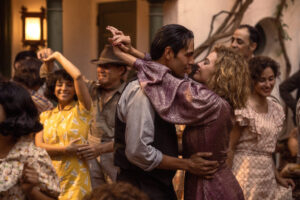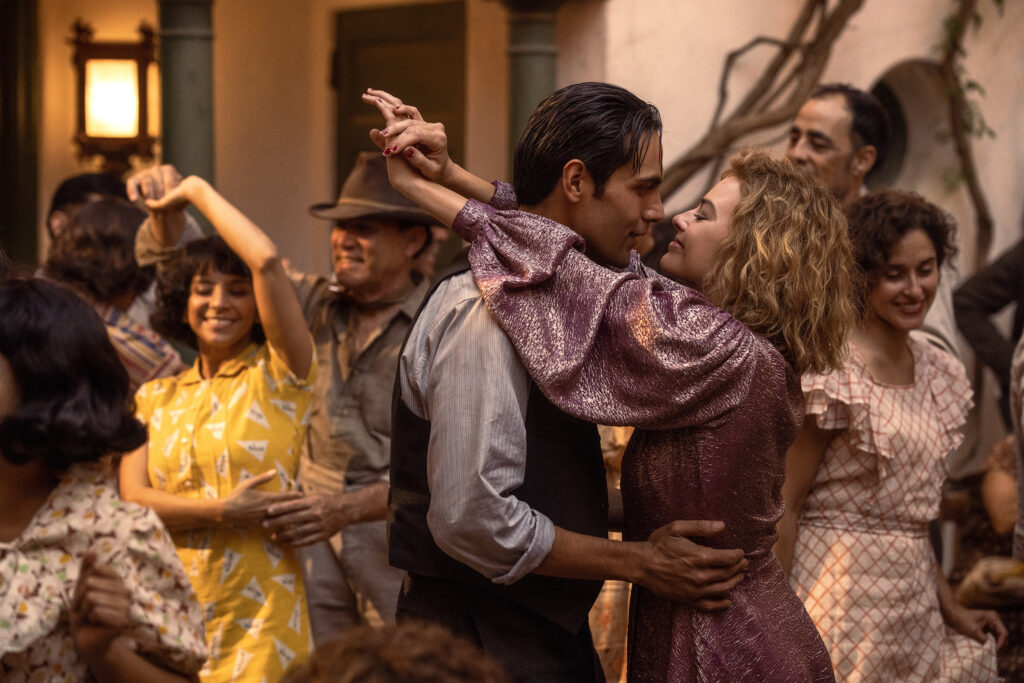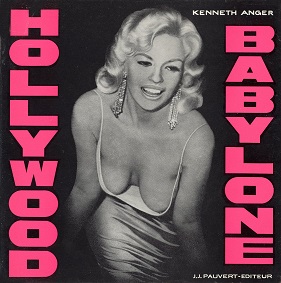Movie Info
Movie Info
- Director
- Damien Chazelle‘
- Run Time
- 3 hours and 8 minutes
- Rating
- R
VP Content Ratings
- Violence
- 3/10
- Language
- 6/10
- Sex & Nudity
- 6/10
- Star Rating
Relevant Quotes
And Babylon, the glory of kingdoms,
the splendor and pride of the Chaldeans,
will be like Sodom and Gomorrah
when God overthrew them.
Whoever sows injustice will reap calamity,
and the rod of anger will fail.
Do not be deceived; God is not mocked, for you reap whatever you sow.

When I first saw the trailer for director Damien Chazelle‘s film I recalled a book I once owned called Hollywood Babylon. Written by underground experimental filmmaker Kenneth Anger, the alleged exposure of Tinseltown’s sins was based largely on rumors supposedly exposing the dark exploits of a host of film stars—these included Charlie Chaplin, Fatty Arbuckle, John Gilbert and a screen full of others stretching up to the 60’s star Jane Mansfield. Chazelle must have been inspired by that book and its overblown stories of filmdom debaucheries, because they are colorfully brought to the big screen in his new film.
The film opens in 1926 with some men led by the Mexican American Manny Torres (Diego Calva) trucking an elephant to a party set in the desert mansion of Don Wallach, the head of the fictional Kinoscope Studios. An elephant at a party!–something that if the booze-saturated party goers can remember afterward, will give them bragging rights for years to come! It seems that the inventive Manny is good at arranging and fixing things, so we will see him rising in status as the long film unwinds toward its bittersweet conclusion. The party itself is so orgiastic, with the wild gyrations of dancers to the jazz music of the Black orchestra that old Cecil B. DeMille would have been envious. (The Hayes Code, which the excessive depravity of the 20s led to, would have vetoed the entire 20 minutes of this sequence.) A woman pees on a well-dressed man beneath her, and all around the cavernous room couples engage in sex.
Those partying, whom we will subsequently follow, are:
-the lesbian Chinese-American actress Lady Fay Zhu (Li Jun Li), whose skill as a script writer is recognized, but not her acting talent, unless the role is that of an Asian or other exotic character;
- matinee idol Jack Conrad (Brad Pitt), at the peak of fame as a leading man;
- Elinor St. John (Jean Smart), a gossip columnist who can make and break careers, and thus fawned on by actors;
- Ruth Adler (Olivia Hamilton), a director (thus reminding us that women did work behind the camera in early Hollywood, though seldom given credit);
- Sidney Palmer (Jovan Adepo), a talented jazz trumpeter who will rise to prominence with the coming of sound, but who will face a moment of denigration because of his race;
- and the New Jersey-born Nellie LaRoy (Margot Robbie), an aspiring star-to-be in a revealing scarlet dress who crashes the party and, drawing attention by her lascivious dancing, leaves with a job working for Ruth Adler. She and Manny are also attracted to each other, thus beginning their long friendship.
There follows a long sequence on Kinoscope’s movie lot where numerous films are being shot. All of these but one are being made on small sets open to the sunlight. The films are silent, so there is no danger of the directors’ yells and other sounds spoiling each other’s films. (Chazelle takes some liberties here, this being a good description of filmmaking in 1916, the industry actually having progressed to large indoor stages by the mid twenties.) One of these is a Western directed by Ruth Adler. The scene being filmed is set in a bar where Nellie is to perform a dance just prior to the entrance of the star. However, Nellie’s sexy performance, especially enhanced by her ability to cry on cue, upstages the star. This will be the start of her climb to fame, she soon becoming known as the “it-girl,” the title that became attached to the real-life actress Clara Bow.
It is fascinating to see all the action on the various sets as the camera swoops over the lot, but the major production is being filmed not on a stage but on the level ground in front of the smaller sets. Hundreds of extras costumed as medieval warriors are running through rehearsals and filming, while Jack, dressed as a knight, sits in his tent drinking heavily.
A crisis arises when a broken camera needs replacing, and Manny is sent into town to bring back a new one. His mad dash is played for humor and suspense, the former due to a question of what kind of a camera is wanted, and the suspense as to whether the only possible one that is still being used but due to be returned at any moment reaches them while there is still daylight. Back on the lot, as star and extras anxiously wait, we are shown numerous shots of the sun as it sinks closer to the horizon. Will Manny’s timely return make him the hero, or will he fail to bring the camera while there is still enough light? Thousands of dollars rest on his timely return.
During ensuing years Nellie rises to stardom and Manny to directing films but also continuing to serve as a fixer. Jack, on the other hand, sees his fame fading as the studio begins to adapt to sound. Nellie soon discovers what an ordeal filming in sound can be, with the noisy camera required being encased in a box as big as a ticket booth and the sound director in a booth way up near the ceiling having authority over the film director, in this case Ruth Adler. Nellie is supposed to walk through a door, stand exactly on the taped line on the floor and say her short speech. She must hit the marks on the floor exactly for the bulky microphone to pick up her voice. Because of extraneous noise, her failure to stand directly on the mark, Nellie’s flustered misreading, and various other reasons, the sound director keeps yelling “Cut.” Everyone becomes frustrated and upset as take after take is made. The cameraman emerges several time to complain of the heat in his cramped booth. When at long last the two or three minute shot is successful, the cameraman stumbles out of his booth and collapses onto the floor, dead.
Jack’s movie career slowly declines, with movies that are, in his words, “sh-t,” the only ones offered him. But for Sidney Palmer sound movies enhance the value of his talent on the trumpet. He is offered a good part as leader of a jazz band, with Manny now directing the film. It is this sequence which reveals the racism that dominated the country, and Hollywood, back then. The producers have noted in the rushes that Palmer’s skin does not match the darker skins of his band members, so they order Manny to give him a tin of burnt cork to darken his face. Both actors do a good job of wordlessly expressing their disgust at such a degrading order. Palmer hesitates for a long moment, staring at the opened tin with the bits of cork, and then at last, smearing it over his face. (Manny himself has had to bow to the prejudice prevelent then against Mexicans, his official biography changing his country of birth to “Spain.”)
Both Nellie and Jack face uncertain futures in the business. Jack turns more and more to drink. Columnist Elinor St. John does not hold back in the sad scene in which she assures him his days as an actor are soon coming to an end. The only consolation she can give him is that future film viewers will know of him because of the films he has left behind. This and other incidents lead him to…
Nellie proves unable to restrain her wildness. During one drunken night partying she challenges her companions to fight a large rattle snake coiled in the road. When no one takes her up, she advances on the snake herself, which strikes her after she picks it up, embedding its fangs into her neck. Fortunately Fay Zhu is present and knows what to do, saving the foolish girl’s life. Far from learning from this, Nellie continues to drink too much, snorts cocaine, and even more dangerous to her well-being, becomes addicted to gambling. She turns to Manny for help when she is in over her head and a mobster threatens her life if she does not pay her debt immediately. This leads Manny and a friend who claims to be able to obtain the money into a grotesque misadventure. They must accompany the mobster into a subterranean haunt to a party even more bizarre than the Hollywood orgy that began the film. Manny is terrified because his friend has filled the bag with fake money, with the intention of being able to escape right away before the mobster discovers the trick.
Barely escaping death but still sought by the gangster, Manny persuades the reluctant Nellie to flee the country and find a place to live together in Mexico. It is no spoiler to reveal that Nellie and Manny’s plan of escape does not come about. The film’s conclusions seem to be an attempt by Chazelle to put a happier face onto what is an obviously dark tale of excess. (Moralists might even see the film as a parable of “the wages of sin.) Although the star-crossed love of Manny and Nellie runs throughout the film, it is often eclipsed by the sequences centering on the film studios’ difficult transition from silent to sound movie making. Both “conclusions” seem to be in conflict with the dark excesses depicted in most of the film.
The first ending shows Manny many years later—his situation you can discover yourself—in a movie theater watching another film about Hollywood changing to sound movies, Singing in the Rain, a film with a far more positive view of Hollywood and its denizens. (This had been foreshadowed earlier in the film by a shot of a chorus line singing the title song.) This is followed by the second ending or postlude, a montage of film bits of the many Hollywood films we have come to love through the years. Perhaps suggesting that good can emerge from such depravity?
Critical reaction to Babylon has ranged from the San Francisco Chronicle’s 100% score to Slant Magazine’s 25% (On IMDB’s Metascore), so at this point you must decide yourself whether or not to watch it, though if you do, I urge you to see it in a theater where alone the sequence on the vast movie lot justifies the ticket price. The film is no doubt too full of sex and nudity for a religious group to discuss it without causing controversy in the congregation. And yet the many issues it raises are precisely those that an adult group exists to discuss—ambition, gred, inventiveness, coping with change, and the price of giving in to “the flesh.”
“Babylon” appears 259 times in the Hebrew Scriptures; 12 in the New Testament; and 56 in the Apocrypha. Much of the time it is simply the name of the city and empire. But it also is used as a pejorative for oppression and sexual excess—“O daughter Babylon, you devastator! Happy shall they be who pay you back what you have done to us!” (Psalm 137:8); and “Babylon the great, mother of whores and of earth’s abominations.” (Rev. 17:5). This was certainly the meaning author Kenneth Anger had in mind when he penned his book Hollywood Babylon. Just as most of this film is fictional set amidst depravity but including some real persons such as producer Irving Thalberg, so much of that book was fiction based on gossip and hearsay. However, it is true that many of the silent movie stars did shine brightly for a few years before their brilliance faded. Nellie LaRoy and Jack Conroy are good stand-ins for Clara Bow and John Gilbert, though by no means were the details of their decline the same.

The orgiastic party early in the film will be off-setting to some, but does show what power, wealth, and lust can do to the human psyche. Damien Chazelle’s depiction of Hollywood transitioning to sound often goes over the top, but the magic of his movie—the result of a great cast, skilled cinemaphotograher (Linus Sandgren, who also shot Chazelle’s LaLa Land), and music by Justin Hurwitz (also scored LaLa land)—will certainly appeal to those who love the movies. Seldom has this been demonstrated as well as in this bizarre film that also serves as an homage to the movies that emerged from that era. This is one of those films in which so much takes place within a scene that it demands to be seen again. I can hardly wait!
This review will be in the January issue of VP along with a set of questions for reflection and/or discussion. If you have found reviews on this site helpful, please consider purchasing a subscription or individual issue in The Store.
Paramount Pictures


